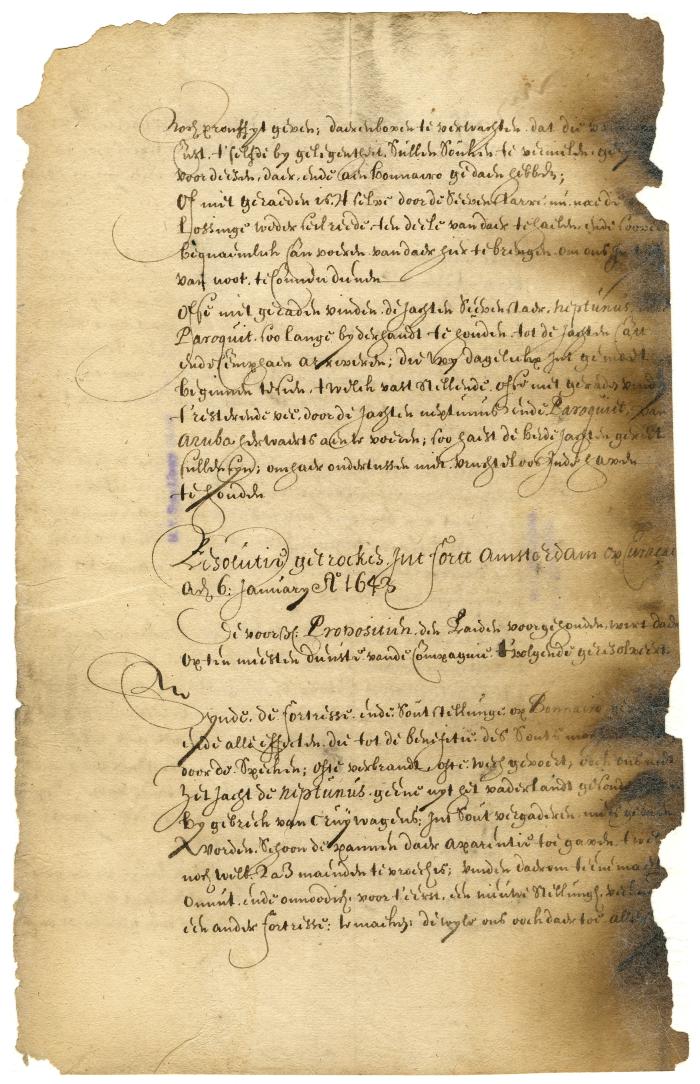Resolutions made at Fort Amsterdam on Curacao, 6 January 1643.
The aforesaid propositions presented to the council, were resolved to the highest benefit of the Company as follows:
If the fortress and saltworks on Bonnairo have been destroyed, and all the equipment used for the processing of salt has been burned or carried away by the specken, [i]and because nothing has been sent to us from the fatherland aboard the yacht De Neptunus, nothing can be done to gather the salt for want of wheelbarrows; although the pans there are probably yielding, it is still two to three months too early; therefore, we find it entirely useless and unnecessary to construct new works immediately, much less another fortress, because we also lack all the materials thereto; unless some salt haulers from Brasil or elsewhere were to arrive, who brought with them wheelbarrows and woodwork. In order to protect for the service of the Company the island and the salt which amounts to about 700 lasten there, we find it advisable to send the sloop there as soon as possible and to hold on to it with some soldiers until further orders from the fatherland or better circumstances in which to provide the island with another fortress.
The fortress Tolckxborch, for want of wheelbarrows and other materials, cannot be brought back to its previous state. Because it would still be necessary to have a garrison there for the protection of the water carriers to defend them against an attack of the Indians who might come for some prisoners with a canoe, we find it advisable to do the same immediately by means of the mounted guard, and for the aforesaid purpose to have a house built there surrounded by palisades, which we believe shall prove to be sufficient against such attacks.
Concerning the Indians of the island of Aruba, who have given us great service and of whom more is to be expected if anymore raids are carried out on the mainland where they are well versed according to experience, we find it advisable to ask them whether they still desire to come here with their cattle to live on the island as they requested previously; because it is to be feared that those of the mainland might try to avenge their recent losses on their few cattle, as they did before in the beginning of 1641, killing and destroying all the domestic animals, which they will now try to do all the more. In view of the Indians loyalty toward us and their open hostile attacks against them, it would be dangerous to maintain a garrison on the island for the protection of the natives without a fortress; to build a fort there would be costly for the Company and depriving the island of cattle completely would make it worthless except for keeping horses, which are not wanting on Curacao, and can be transported from there afterwards, according to need and opportunity.
Concerning the last two propositions, we find it not only advisable but also necessary and beneficial for this island that the cattle be brought from there to this place as soon as possible in order to be of service to us in time of need, and for this purpose to use all vessels at hand as soon as it is appropriate to sail. We hope that in the meantime the yachts Catt and Cemphaen will come up, [ii] for which we have been waiting, otherwise the yachts on hand would fruitlessly remain idle in the harbor. Therefore, we consider it to be of service to the Company that the yacht Seeven Staere, which is now ready to sail as soon as possible, be sent to Aruba for the aforesaid stock and in the meantime make the Neptunus and Paroquiet ready in order to follow them.
Thus resolved and concluded at the place, day and year as above. In acknowledgment whereof we have signed this with our own hands,
P Stuyvesant
Jacob Lopper
Brian Newton
L. Rodenborch
Jacob Tijssen Pal
Rights: This translation is provided for education and research purposes, courtesy of the New York State Library Manuscripts and Special Collections], Mutual Cultural Heritage Project. Rights may be reserved. Responsibility for securing permissions to distribute, publish, reproduce or other use rest with the user. For additional information see our Copyright and Use Statement]



